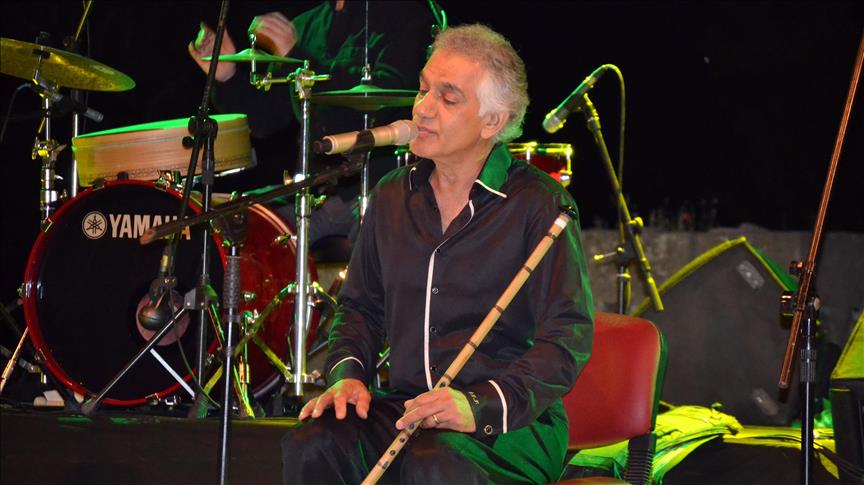 Omar Faruk Tekbilek, Turkish multi-instrumentalist and composer
Omar Faruk Tekbilek, Turkish multi-instrumentalist and composer
Ankara
By Vasiliki Mitsiniotou
ATHENS
Though often at odds in the past, Greece and Turkey share a bond revealed not only in food or language but also in music celebrated on both sides of the Aegean Sea.
Turks and Greeks have preserved many similarities when it comes to music, from style to instruments and lyrics.
Cooperation between Turkish and Greek singers has been a stalwart and singers and musicians from both countries are known on both sides of the Aegean Sea.
Omar Faruk Tekbilek, a Turkish multi-instrumentalist and composer who has worked with Greek musicians in the past, performed in Athens in June while a concert on the island of Lesbos showcased dervishes of the Mevlevi Order of Konya.
Asia Minor and Istanbul music -- the kind played by motley bands featuring violins, lyres, and other stringed instruments such as baglamas, outis, saz, santouris, bouzoukis and clarinets -- are especially prevalent in both countries
“The songs found in both musical traditions mainly come from the region of Marmara and they are popular folk songs with lyrics in both languages, some of which were recorded in Greece from the late 1920s until the Second World War,” says Nikos Andrikos, from the musicology department of Ionian University and research associate at the Technological Educational Institute of Traditional Music in Arta.
“I had the good fortune to work with Vasilis Soukas, a master of the clarinet from Arta who would often welcome the leading Turkish clarinet player Mustafa Kandirali on stage and without talking, they would perfectly connect,” adds Ross Daly, master of many musical instruments who lives in Crete and who has repeatedly teamed up with musicians from around the world.
Most of the songs, similar in both Turkey and Greece, are about life before and after the population exchange between Greece and Turkey. In 1923, approximately 2 million people migrated to and fro across the Aegean Sea, based on their religious background, as part of an agreement reached between both countries.
This meant many Greek-speaking people traveled to Turkey and vice-versa, many visibly affected by nostalgia for lost homelands.
In her 2016 book The Fall of Cities in the Mediterranean: Commemoration in Literature, Folk-Song, and Liturgy, classics professor at Willamette University, in Oregon, in the U.S., Mary R. Bachvarova writes:
“The sheer numbers of refugees provided for both an audience for the music and musicians to perform it. Amanedhes and rebetika were among the musical forms and dances performed in Smyrna [Izmir], of special interest. Amanedhes are songs which feature long, often intricate vocal improvisation in which the singer demonstrated his or her knowledge of the Ottoman modes or makamlar.”
“Rebetika originate from Asia Minor and they were recorded in Greece after the arrival of refugees. Greek lyrics were used for that reason. There is often a confusion and people tend to think all Minor Asia and Istanbul songs are rebetika,” says Ross Daly.
Amanedhes and rebetika can be heard in both Turkish meyhanes and Greek taverns.
Daly sees “some identical music genres [between the two countries], but what differs is the language and characteristics based on the region, so these are regional differences rather than national because music does not move nationally but locally. There are Greeks areas such as southern Epirus or Preveza where you will find tracks closely related to the sounds of Minor Asia which share a common sound with Anatolia and of course there are songs in Crete and Minor Asia which originate from the Black Sea.”
Daly rejects the notion that Byzantine music is the basis of it all. “Ottoman urban music originates from both the Persian and the Byzantine tradition and from Central Asia. In other words, the influences [...] are much more complex,” he says.
Some Greek and Turkish musicians even join forces beyond their countries’ borders. For instance, artists Nikolaos Rondelis and Murat Sanalmis, who live in Wuppertal and regularly make the tavern rounds in Germany, many times together.
“There is no difference between us” says Rondelis who plays oud and bouzouki. “It is natural to play with other musicians who share the same music theory and rhythm. We understand each other.”
Anadolu Agency website contains only a portion of the news stories offered to subscribers in the AA News Broadcasting System (HAS), and in summarized form. Please contact us for subscription options.





